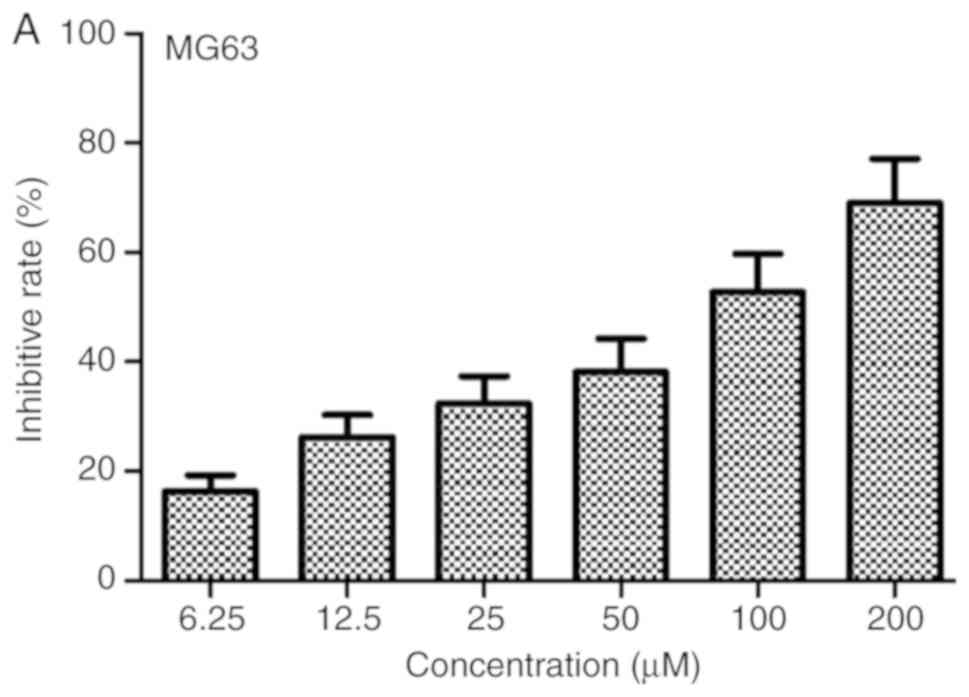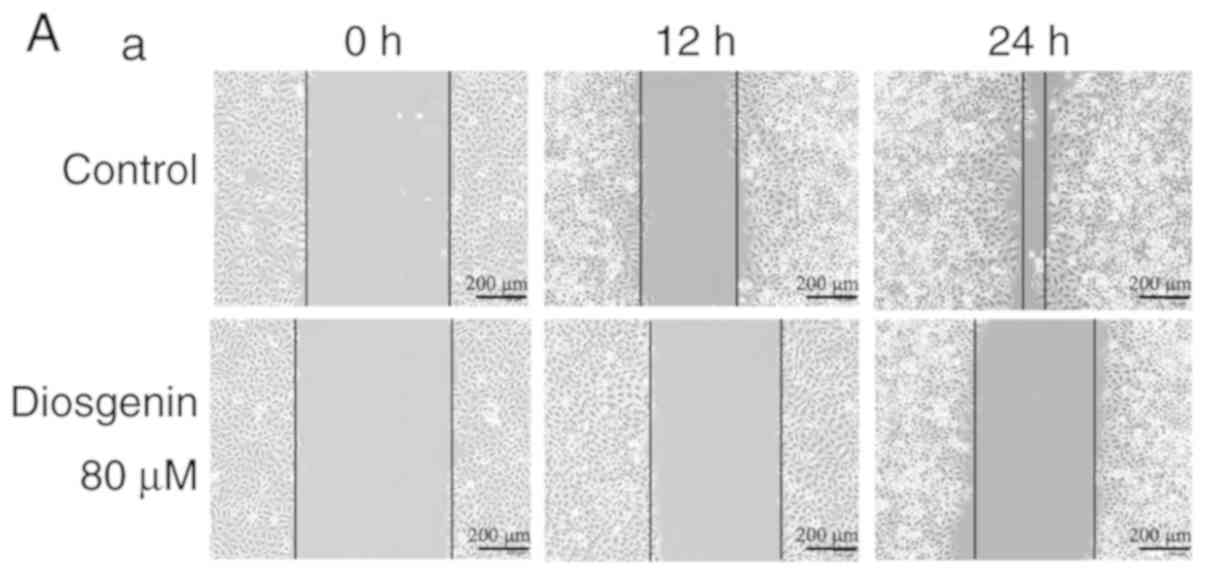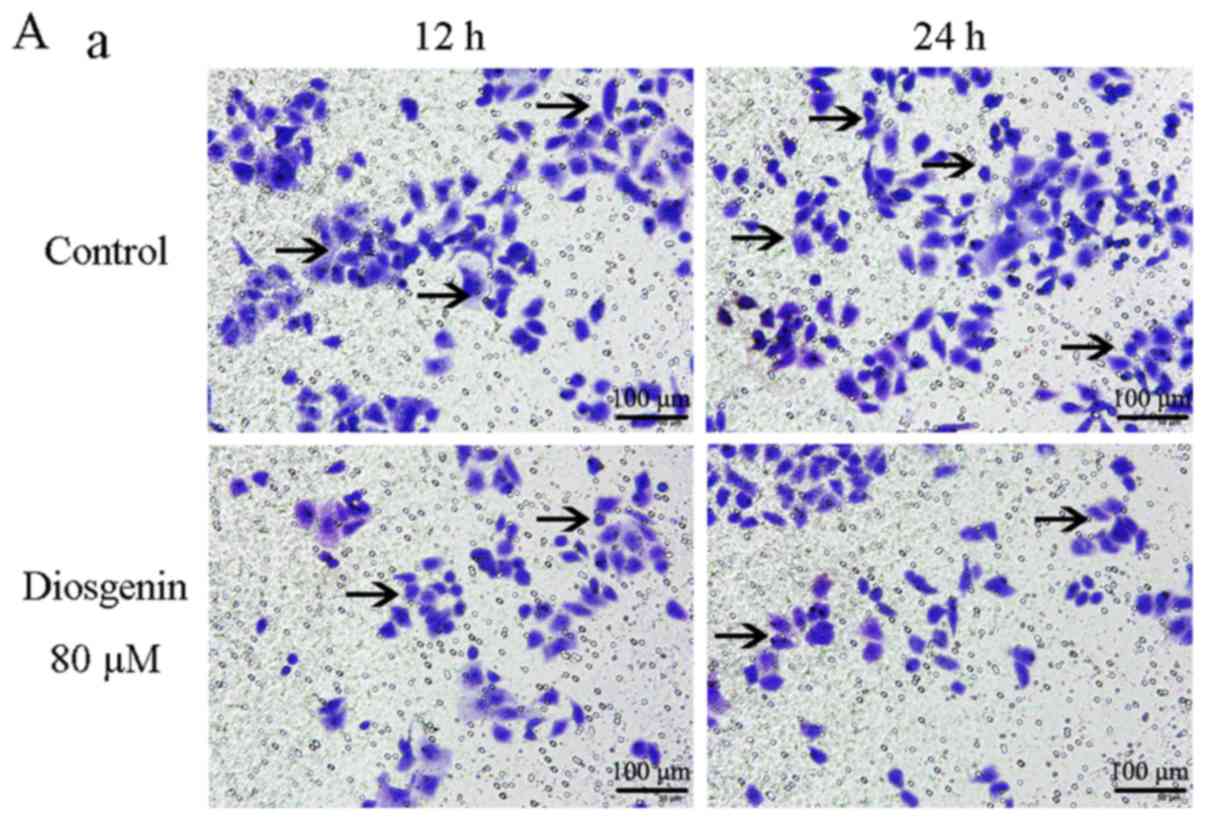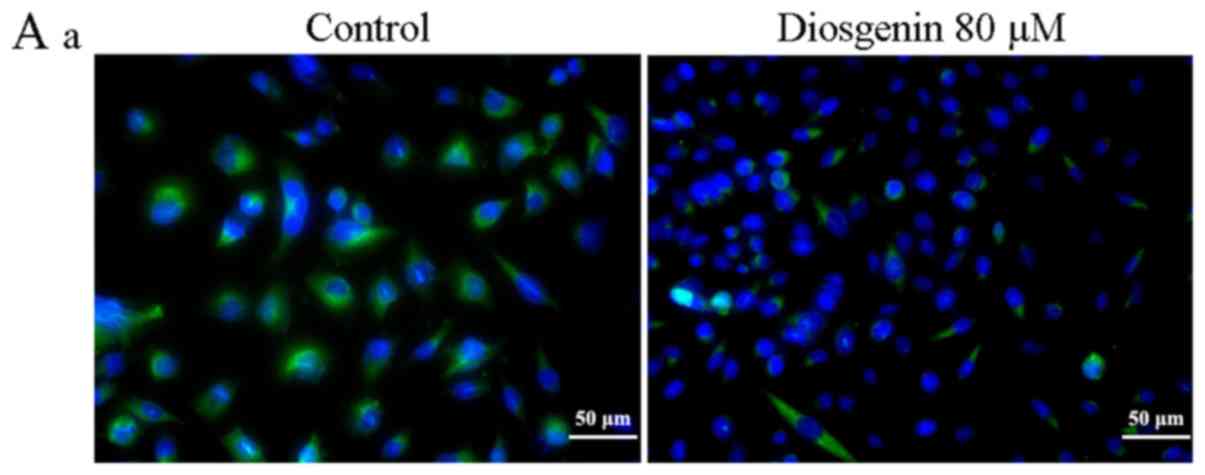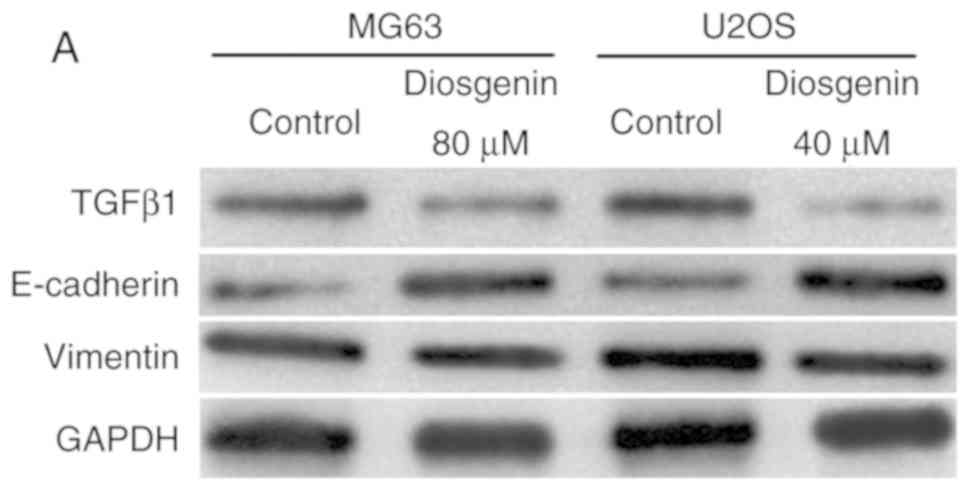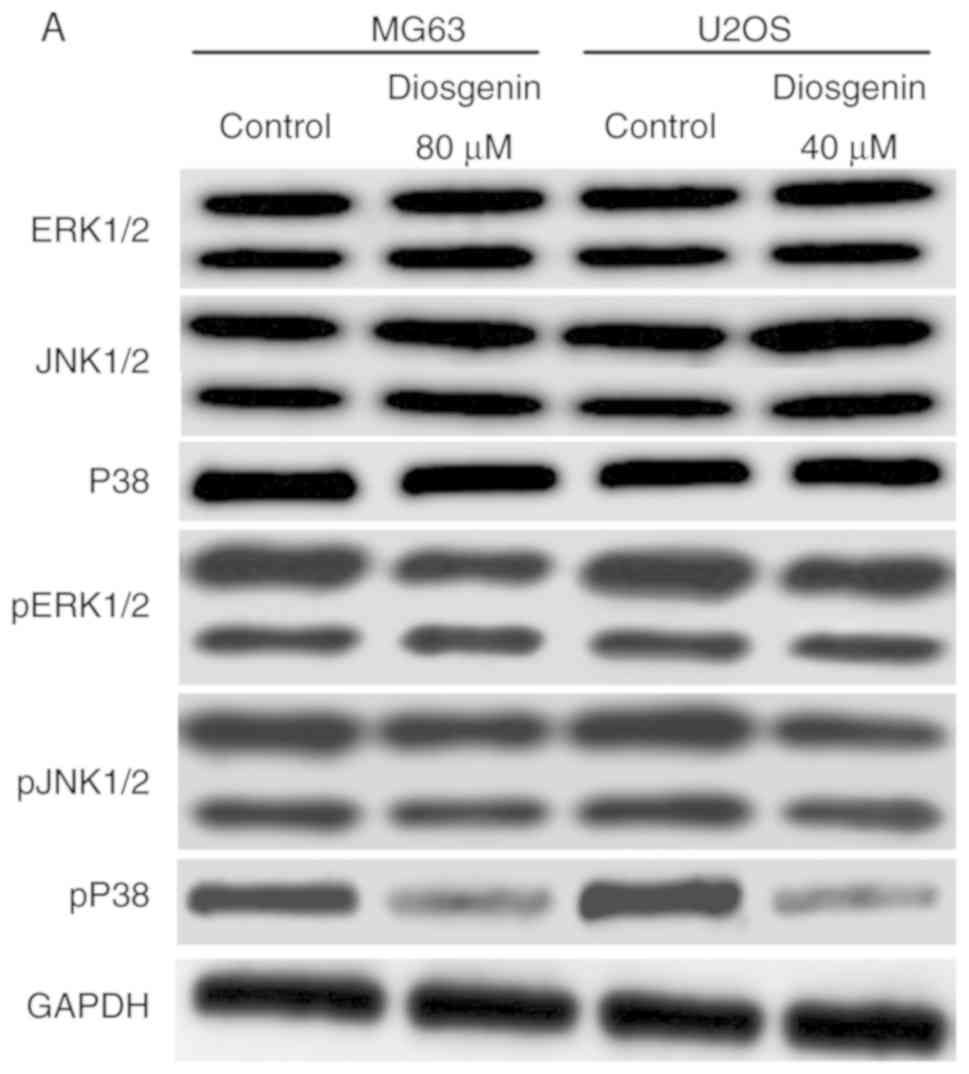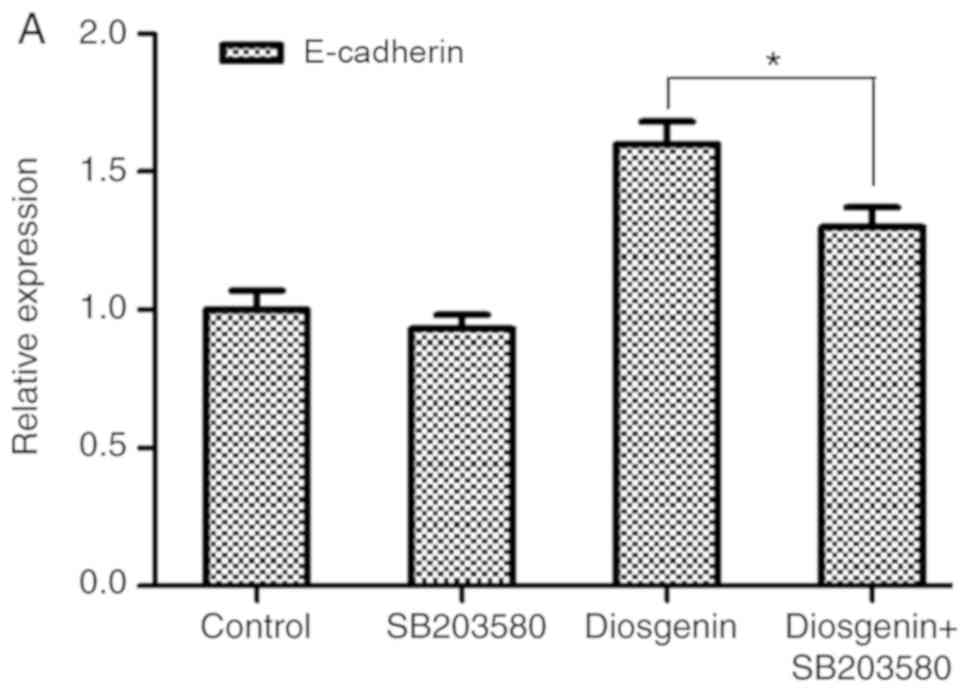|
1
|
Anderson ME: Update on survival in
osteosarcoma. Orthop Clin North Am. 47:283–292. 2016. View Article : Google Scholar : PubMed/NCBI
|
|
2
|
Fujiwara T, Oda M, Yoshida A, Ogura K,
Chuman H, Kusumoto M and Kawai A: Atypical manifestation of lung
metastasis 17 years after initial diagnosis of low-grade
centralosteosarcoma. J Orthop Sci. 22:357–361. 2017. View Article : Google Scholar : PubMed/NCBI
|
|
3
|
Zhang Y, He Z, Li Y, Yang Y, Shi J, Liu X,
Yuan T, Xia J, Li D, Zhang J and Yang Z: Selection of surgical
methods in the treatment of upper tibia osteosarcoma and prognostic
analysis. Oncol Res Treat. 40:528–532. 2017. View Article : Google Scholar : PubMed/NCBI
|
|
4
|
Deng ZP, Liu BY, Sun Y, Jin T, Li B, Ding
Y and Niu XH: Transition from tumor tissue to bone marrow in
patients with appendicular osteosarcoma after neoadjuvant
chemotherapy. Chin Med J (Engl). 130:2215–2218. 2017. View Article : Google Scholar : PubMed/NCBI
|
|
5
|
Zhao K, Yang SY, Geng J, Gong X, Gong W,
Shen L and Ning B: Combination of anginex gene therapy and
radiation decelerates the growth and pulmonary metastasis of human
osteosarcoma xenografts. Cancer Med. 7:2518–2529. 2018. View Article : Google Scholar : PubMed/NCBI
|
|
6
|
Fenger JM, London CA and Kisseberth WC:
Canine osteosarcoma: A naturally occurring disease to inform
pediatric oncology. ILAR J. 55:69–85. 2014. View Article : Google Scholar : PubMed/NCBI
|
|
7
|
Zhang Y, Hu Q, Li G, Li L, Liang S, Zhang
Y, Liu J, Fan Z, Li L, Zhou B, et al: ONZIN upregulation by mutant
p53 contributes to osteosarcoma metastasis through the CXCL5-MAPK
signaling pathway. Cell Physiol Biochem. 48:1099–1111. 2018.
View Article : Google Scholar : PubMed/NCBI
|
|
8
|
Zhuo B, Li Y, Gu F, Li Z, Sun Q, Shi Y,
Shen Y, Zhang F, Wang R and Wang X: Overexpression of CD155 relates
to metastasis and invasion in osteosarcoma. Oncol Lett.
15:7312–7318. 2018.PubMed/NCBI
|
|
9
|
Liu P, Yang P, Zhang Z, Liu M and Hu S:
Ezrin/NF-κB pathway regulates EGF-induced epithelial-mesenchymal
transition (EMT), metastasis, and progression of osteosarcoma. Med
Sci Monit. 24:2098–2108. 2018. View Article : Google Scholar : PubMed/NCBI
|
|
10
|
Chen Y, Tang YM, Yu SL, Han YW, Kou JP,
Liu BL and Yu BY: Advances in the pharmacological activities and
mechanisms of diosgenin. Chin J Nat Med. 13:578–587.
2015.PubMed/NCBI
|
|
11
|
Yan W, Ji L, Hang S and Shun Y: New ionic
liquid-based preparative method for diosgenin from Rhizoma
dioscoreae nipponicae. Pharmacogn Mag. 9:250–254. 2013.
View Article : Google Scholar : PubMed/NCBI
|
|
12
|
Kiasalari Z, Rahmani T, Mahmoudi N,
Baluchnejadmojarad T and Roghani M: Diosgenin ameliorates
development of neuropathic pain in diabetic rats: Involvement of
oxidative stress and inflammation. Biomed Pharmacother. 86:654–661.
2017. View Article : Google Scholar : PubMed/NCBI
|
|
13
|
Hua S, Li Y, Su L and Liu X: Diosgenin
ameliorates gestational diabetes through inhibition of sterol
regulatory element-binding protein-1. Biomed Pharmacother.
84:1460–1465. 2016. View Article : Google Scholar : PubMed/NCBI
|
|
14
|
Wei Z, Xin G, Wang H, Zheng H, Ji C, Gu J,
Ma L, Qin C, Xing Z, Niu H and Huang W: The diosgenin prodrug
nanoparticles with pH-responsive as a drug delivery system uniquely
prevents thrombosis without increased bleeding risk. Nanomedicine.
14:673–684. 2018. View Article : Google Scholar : PubMed/NCBI
|
|
15
|
Huang CH, Wang CC, Lin YC, Hori M and Jan
TR: Oral administration with diosgenin enhances the induction of
intestinal T helper 1-like regulatory T cells in a murine model of
food allergy. Int Immunopharmacol. 42:59–66. 2017. View Article : Google Scholar : PubMed/NCBI
|
|
16
|
Wang YJ, Pan KL, Hsieh TC, Chang TY, Lin
WH and Hsu JT: Diosgenin, a plant-derived sapogenin, exhibits
antiviral activity in vitro against hepatitis C virus. J Nat Prod.
74:580–584. 2011. View Article : Google Scholar : PubMed/NCBI
|
|
17
|
Pons-Fuster López E, Wang QT, Wei W and
López Jornet P: Potential chemotherapeutic effects of diosgenin,
zoledronic acid and epigallocatechin-3-gallate on PE/CA-PJ15 oral
squamous cancer cell line. Arch Oral Biol. 82:141–146. 2017.
View Article : Google Scholar : PubMed/NCBI
|
|
18
|
Bhuvanalakshmi G, Basappa, Rangappa KS,
Dharmarajan A, Sethi G, Kumar AP and Warrier S: Breast cancer
stem-like cells are inhibited by diosgenin, a steroidal saponin, by
the attenuation of the Wnt β-catenin signaling via the Wnt
antagonist secreted frizzled related protein-4. Front Pharmacol.
8:1242017. View Article : Google Scholar : PubMed/NCBI
|
|
19
|
Nie C, Zhou J, Qin X, Shi X, Zeng Q, Liu
J, Yan S and Zhang L: Diosgenin-induced autophagy and apoptosis in
a human prostate cancer cell line. Mol Med Rep. 14:4349–4359. 2016.
View Article : Google Scholar : PubMed/NCBI
|
|
20
|
Cai B, Liao A, Lee KK, Ban JS, Yang HS, Im
YJ and Chun C: Design, synthesis of methotrexate-diosgenin
conjugates and biological evaluation of their effect on
methotrexate transport- resistant cells. Steroids. 116:45–51. 2016.
View Article : Google Scholar : PubMed/NCBI
|
|
21
|
Ghosh S, More P, Derle A, Kitture R, Kale
T, Gorain M, Avasthi A, Markad P, Kundu GC, Kale S, et al:
Diosgenin functionalized iron oxide nanoparticles as novel
nanomaterial against breast cancer. J Nanosci Nanotechnol.
15:9464–9472. 2015. View Article : Google Scholar : PubMed/NCBI
|
|
22
|
Ding W, Jiang Y, Jiang Y, Zhu T, Xu Y,
Jiang W, Zhu W, Tang Z, Ge Z, Ma T and Tan Y: Role of SB203580 in
the regulation of human esophageal cancer cells under the effection
of diosgenin. Int J Clin Exp Med. 8:2476–2479. 2015.PubMed/NCBI
|
|
23
|
Goossens S, Vandamme N, Van Vlierberghe P
and Berx G: EMT transcription factors in cancer development
re-evaluated: Beyond EMT and MET. Biochim Biophys Acta Rev Cancer.
1868:584–591. 2017. View Article : Google Scholar : PubMed/NCBI
|
|
24
|
Singh M, Yelle N, Venugopal C and Singh
SK: EMT: Mechanisms and therapeutic implications. Pharmacol Ther.
182:80–94. 2018. View Article : Google Scholar : PubMed/NCBI
|
|
25
|
Cao Z, Livas T and Kyprianou N: Anoikis
and EMT: Lethal ‘Liaisons’ during cancer progression. Crit Rev
Oncog. 21:155–168. 2016. View Article : Google Scholar : PubMed/NCBI
|
|
26
|
Illam SP, Narayanankutty A, Mathew SE,
Valsalakumari R, Jacob RM and Raghavamenon AC: Epithelial
mesenchymal transition in cancer progression: Prev entive
phytochemicals. Recent Pat Anticancer Drug Discov. 12:234–246.
2017. View Article : Google Scholar : PubMed/NCBI
|
|
27
|
Zahedi A, Phandthong R, Chaili A, Remark G
and Talbot P: Epithelial-to-mesenchymal transition of A549 lung
cancer cells exposed to electronic cigarettes. Lung Cancer.
122:224–233. 2018. View Article : Google Scholar : PubMed/NCBI
|
|
28
|
Wang X, Liang X, Liang H and Wang B:
SENP1/HIF-1α feedback loop modulates hypoxia-induced cell
proliferation, invasion and EMT in human osteosarcoma cells. J Cell
Biochem. 119:1819–1826. 2018. View Article : Google Scholar : PubMed/NCBI
|
|
29
|
Chen Y, Zhang K, Li Y and He Q:
Estrogen-related receptor α participates transforming growth
factor-β (TGF-β) induced epithelial-mesenchymal transition of
osteosarcoma cells. Cell Adh Migr. 11:338–346. 2017. View Article : Google Scholar : PubMed/NCBI
|
|
30
|
Livak KJ and Schmittgen TD: Analysis of
relative gene expression data using real-time quantitative PCR and
the 2(-Delta Delta C(T)) method. Methods. 25:402–408. 2001.
View Article : Google Scholar : PubMed/NCBI
|
|
31
|
Wu J, Weng Y, He F, Liang D and Cai L:
LncRNA MALAT-1 competitively regulates miR-124 to promote EMT and
development of non-small-cell lung cancer. Anticancer Drugs.
29:628–636. 2018. View Article : Google Scholar : PubMed/NCBI
|
|
32
|
Chen C, Liang QY, Chen HK, Wu PF, Feng ZY,
Ma XM, Wu HR and Zhou GQ: DRAM1 regulates the migration and
invasion of hepatoblastoma cells via autophagy-EMT pathway. Oncol
Lett. 16:2427–2433. 2018.PubMed/NCBI
|
|
33
|
Cheng G, Gao F, Sun X, Bi H and Zhu Y:
Paris saponin VII suppresses osteosarcoma cell migration and
invasion by inhibiting MMP-2/9 production via the p38 MAPK
signaling pathway. Mol Med Rep. 14:3199–3205. 2016. View Article : Google Scholar : PubMed/NCBI
|
|
34
|
Zhan L, Chen L and Chen Z: Knockdown of
FUT3 disrupts the proliferation, migration, tumorigenesis and TGF-β
induced EMT in pancreatic cancer cells. Oncol Lett. 16:924–930.
2018.PubMed/NCBI
|
|
35
|
Kaur G, Li CG, Chantry A, Stayner C,
Horsfield J and Eccles MR: SMAD proteins directly suppress PAX2
transcription downstream of transforming growth factor-beta 1
(TGF-β1) signalling in renal cell carcinoma. Oncotarget.
9:26852–26867. 2018.PubMed/NCBI
|
|
36
|
David CJ, Huang YH, Chen M, Su J, Zou Y,
Bardeesy N, Iacobuzio-Donahue CA and Massagué J: TGF-β tumor
suppression through a lethal EMT. Cell. 164:1015–1030. 2016.
View Article : Google Scholar : PubMed/NCBI
|
|
37
|
Chen CL, Chen YH, Tai MC, Liang CM, Lu DW
and Chen JT: Resveratrol inhibits transforming growth
factor-β2-induced epithelial-to-mesenchymal transition in human
retinal pigment epithelial cells by suppressing the smad pathway.
Drug Des Devel Ther. 11:163–173. 2017. View Article : Google Scholar : PubMed/NCBI
|
|
38
|
Huang TW, Li ST, Fang KM and Young TH:
Hyaluronan antagonizes the differentiation effect of TGF-β1 on
nasal epithelial cells through down-regulation of TGF-β type I
receptor. Artif Cells Nanomed Biotechnol. 46 (Suppl 3):S254–S263.
2018. View Article : Google Scholar : PubMed/NCBI
|
|
39
|
Duan W, Qian W, Zhou C, Cao J, Qin T, Xiao
Y, Cheng L, Li J, Chen K, Li X, et al: Metformin suppresses the
invasive ability of pancreatic cancer cells by blocking autocrine
TGF-β1 signaling. Oncol Rep. 40:1495–1502. 2018.PubMed/NCBI
|
|
40
|
Ohtani H, Terashima T and Sato E: Immune
cell expression of TGFβ1 in cancer with lymphoid stroma: Dendritic
cell and regulatory T cell contact. Virchows Arch. 472:1021–1028.
2018. View Article : Google Scholar : PubMed/NCBI
|
|
41
|
Tao Y, Sturgis EM, Huang Z, Wang Y, Wei P,
Wang JR, Wei Q and Li G: TGFβ1 genetic variants predict clinical
outcomes of HPV-positive oropharyngeal cancerpatients after
definitive radiotherapy. Clin Cancer Res. 24:2225–2233. 2018.
View Article : Google Scholar : PubMed/NCBI
|
|
42
|
Song J and Shi W: The concomitant
apoptosis and EMT underlie the fundamental functions of TGF-β. Acta
Biochim Biophys Sin (Shanghai). 50:91–97. 2018. View Article : Google Scholar : PubMed/NCBI
|
|
43
|
Wang YP, Wang QY, Li CH and Li XW: COX-2
inhibition by celecoxib in epithelial ovarian cancer attenuates
E-cadherin suppression through reduced Snail nuclear translocation.
Chem Biol Interact. 292:24–29. 2018. View Article : Google Scholar : PubMed/NCBI
|
|
44
|
Li X, Chen H, Liu Z, Ye Z, Gou S and Wang
C: Overexpression of MIST1 reverses the epithelial-mesenchymal
transition and reduces the tµmorigenicity of pancreatic cancer
cells via the Snail/E-cadherin pathway. Cancer Lett. 431:96–104.
2018. View Article : Google Scholar : PubMed/NCBI
|
|
45
|
Yang Y, Shen J, Yan D, Yuan B, Zhang S,
Wei J and Du T: Euchromatic histone lysine methyltransferase 1
regulates cancer development in human gastric cancer by regulating
E-cadherin. Oncol Lett. 15:9480–9486. 2018.PubMed/NCBI
|
|
46
|
Zhu S, Deng S, He C, Liu M, Chen H, Zeng
Z, Zhong J, Ye Z, Deng S, Wu H, et al: Reciprocal loop of
hypoxia-inducible factor-1α (HIF-1α) and metastasis-associated
protein 2 (MTA2) contributes to the progression of pancreatic
carcinoma by suppressing E-cadherintranscription. J Pathol.
245:349–360. 2018. View Article : Google Scholar : PubMed/NCBI
|
|
47
|
Ma L, Liu L, Ma Y, Xie H, Yu X, Wang X,
Fan A, Ge D, Xu Y, Zhang Q and Song C: The role of
E-cadherin/β-catenin in hydroxysafflor yellow a inhibiting
adhesion, invasion, migration and lung metastasis of hepatoma
cells. Biol Pharm Bull. 40:1706–1715. 2017. View Article : Google Scholar : PubMed/NCBI
|
|
48
|
Karim NA, Eldessouki I, Yellu M, Namad T,
Wang J and Gaber O: A case study in advanced lung cancer patients
with vimentin over expression. Clin Lab. 63:1575–1579. 2017.
View Article : Google Scholar : PubMed/NCBI
|
|
49
|
Noh H, Yan J, Hong S, Kong LY,
Gabrusiewicz K, Xia X, Heimberger AB and Li S: Discovery of cell
surface vimentin targeting mAb for direct disruption of GBM tumor
initiating cells. Oncotarget. 7:72021–72032. 2016. View Article : Google Scholar : PubMed/NCBI
|
|
50
|
Lou L, Yu Z, Wang Y, Wang S and Zhao Y:
c-Src inhibitor selectively inhibits triple negative breast cancer
overexpressed vimentin in vitro and in vivo. Cancer Sci.
109:1648–1659. 2018. View Article : Google Scholar : PubMed/NCBI
|
|
51
|
Xu CY, Qin MB, Tan L, Liu SQ and Huang JA:
NIBP impacts on the expression of E-cadherin, CD44 and vimentin in
colon cancer via the NF-κB pathway. Mol Med Rep. 13:5379–5385.
2016. View Article : Google Scholar : PubMed/NCBI
|
|
52
|
Vyas AR and Singh SV: Functional relevance
of D, L-sulforaphane-mediated induction of vimentin and plasminogen
activator inhibitor-1 in human prostate cancer cells. Eur J Nutr.
53:843–852. 2014. View Article : Google Scholar : PubMed/NCBI
|
|
53
|
Huang M, Wang YP, Zhu LQ, Cai Q, Li HH and
Yang HF: MAPK pathway mediates epithelial-mesenchymal transition
induced by paraquat in alveolar epithelial cells. Environ Toxicol.
31:1407–1414. 2016. View Article : Google Scholar : PubMed/NCBI
|
|
54
|
Xiao K, Cao S, Jiao L, Song Z, Lu J and Hu
C: TGF-β1 protects intestinal integrity and influences Smads and
MAPK signal pathways in IPEC-J2 after TNF-α challenge. Innate
Immun. 23:276–284. 2017. View Article : Google Scholar : PubMed/NCBI
|
|
55
|
Park JH, Yoon J, Lee KY and Park B:
Effects of geniposide on hepatocytes undergoing
epithelial-mesenchymal transition in hepatic fibrosis by targeting
TGFβ/Smad and ERK-MAPK signaling pathways. Biochimie. 113:26–34.
2015. View Article : Google Scholar : PubMed/NCBI
|
|
56
|
Jiang Y, Wu C, Boye A, Wu J, Wang J, Yang
X and Yang Y: MAPK inhibitors modulate Smad2/3/4 complex
cyto-nuclear translocation in myofibroblasts via Imp7/8 mediation.
Mol Cell Biochem. 406:255–262. 2015. View Article : Google Scholar : PubMed/NCBI
|
|
57
|
Kang HM, Park BS, Kang HK, Park HR, Yu SB
and Kim IR: Delphinidin induces apoptosis and inhibits
epithelial-to-mesenchymal transition via the ERK/p38 MAPK-signaling
pathway in human osteosarcoma cell lines. Environ Toxicol.
33:640–649. 2018. View Article : Google Scholar : PubMed/NCBI
|
|
58
|
Wei J, Li Z, Chen W, Ma C, Zhan F, Wu W
and Peng Y: AEG-1 participates in TGF-beta1-induced EMT through p38
MAPK activation. Cell Biol Int. 37:1016–1021. 2013. View Article : Google Scholar : PubMed/NCBI
|
|
59
|
Lyu Z, Cao J, Wang J and Lian H:
Protective effect of vitexin reduces sevoflurane-induced neuronal
apoptosis through HIF-1α, VEGF and p38 MAPK signaling pathway in
vitro and in newborn rats. Exp Ther Med. 15:3117–3123.
2018.PubMed/NCBI
|
|
60
|
Xiang S, Xiang T, Xiao Q, Li Y, Shao B and
Luo T: Zinc-finger protein 545 is inactivated due to promoter
methylation and functions as a tumor suppressor through the
Wnt/β-catenin, PI3K/AKT and MAPK/ERK signaling pathways in
colorectal cancer. Int J Oncol. 51:801–811. 2017. View Article : Google Scholar : PubMed/NCBI
|
|
61
|
Kello M, Kulikova L, Vaskova J, Nagyova A
and Mojzis J: Fruit peel polyphenolic extract induced apoptosis in
human breast cancer cells is associated with ROS production and
modulation of p38MAPK/Erk1/2 and the Akt signaling pathway. Nutr
Cancer. 69:920–931. 2017. View Article : Google Scholar : PubMed/NCBI
|
|
62
|
Long C, Chen J, Zhou H, Jiang T, Fang X,
Hou D, Liu P and Duan H: Diosgenin exerts its tumor suppressive
function via inhibition of Cdc20 in osteosarcoma cells. Cell Cycle.
18:346–358. 2019. View Article : Google Scholar : PubMed/NCBI
|















